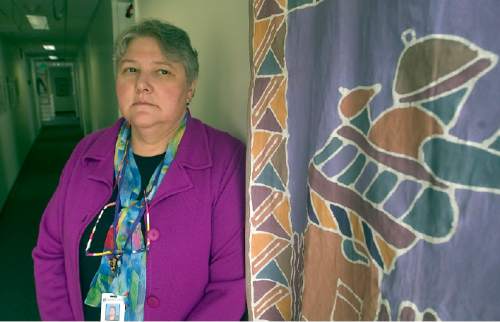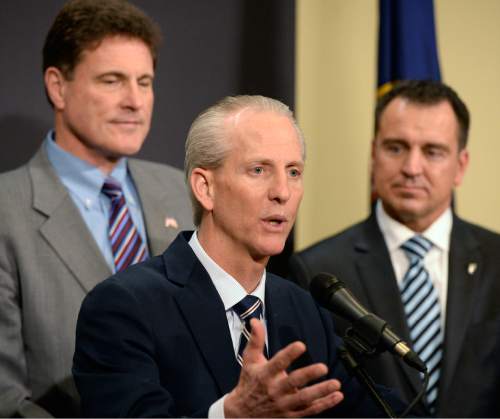This is an archived article that was published on sltrib.com in 2016, and information in the article may be outdated. It is provided only for personal research purposes and may not be reprinted.
Among 356 new state laws taking effect Tuesday is one requiring anesthesia during an abortion for fetuses beyond 20 weeks of development. Critics say that is not medically possible, and some hope to challenge the law in court eventually.
In addition, a Medicaid expansion finally takes effect after years of fierce political battles, offering care to 16,000 of the poorest Utahns — but leaving another 45,000 people below the poverty level and tens of thousands of others without coverage.
And Rocky Mountain Power will benefit from a bill critics say will allow the electric company to sidestep the Public Service Commission and could hurt Utah's rooftop-solar industry and increase power bills. It was defeated by the House on the final day of the Legislature, but 13 members switched votes to resurrect and pass it amid a massive lobbying blitz.
But the first-of-its-kind abortion bill — which created national headlines for the Beehive State — may be the most controversial of all the new laws.
Abortion providers previously had to give information to a patient about whether a fetus may feel pain after 20 weeks of gestation, communicate the risks of fetal anesthesia and offer anesthesia for the fetus before the procedure.
SB234 makes the anesthesia mandatory.
Sen. Curt Bramble, R-Provo, who sponsored the measure, told lawmakers he would ban abortions if he could, but the U.S. Supreme Court has blocked such attempts.
"This will require that if we are going to take the life of an unborn child," he said during debate, "then anesthesia would be required to protect the child from the infliction of pain at the time their life is forfeit."
The problem, said Leah Torres, an OB-GYN in Salt Lake City, is that what the bill requires is not medically possible.
"There is no medical practice that involves administering analgesia [pain relief] to a fetus," she said. During inside-the-uterus fetal surgery, "the fetus is given a paralytic as a form of anesthesia but not a pain reliever."
Torres said that means, "Either I will continue to provide the medical standard of care to my patients that result in breaking a law I don't know how to follow or I'm going to have to invent some sort of fetal analgesia and essentially experiment on my patients in order to comply with the law."
She added, "A pregnant woman doesn't have a say in the matter. She must undergo experimental treatments or she cannot have an abortion. It's nothing short of reproductive coercion."
Karrie Galloway, CEO of Planned Parenthood of Utah, said, "This is harassment of women, plain and simple. There is no scientifically accepted data that fetuses have the physical structure to feel pain before the third trimester, which is at 27-29 weeks."
But Maureen Condic, an associate professor of neurobiology and anatomy at the University of Utah, testified to Congress in 2013 that fetuses delivered prematurely, as early as 23 weeks, show clear pain-related behavior. She urged Congress to ban all abortions of fetuses older than 20 weeks because of the possibility of pain.
Galloway said the new law may not affect many abortions. Data show, she said, that 17 abortions of fetuses older than 20 weeks occurred in Utah in 2014. "The majority of those were for fetal anomalies, or because the life or health of the mother was in danger. My understanding is the way this law ended up, those are not affected by this bill."
Galloway added that Planned Parenthood "will do our best, as we always do, to comply with the law. But because this was a message bill, there wasn't much direction." But violators could face a class A misdemeanor and face losing their medical license.
Karen McCreary, executive director of the American Civil Liberties Union of Utah, said she is not aware of anyone planning to challenge the bill in court. "We would consider a challenge," she said, but "we don't have any plaintiffs, and we haven't heard of anyone interested in bringing that who would have standing."
However, she said the new law "continues to put confusion and real barriers into women's ability to seek medical treatment, and for doctors to provide it, and real inappropriate disruption into that very important relationship."
She said she's heard of groups generally interested in challenging the law, but "it's unchartered territory since we're the first state to have a piece of legislation like this."
—
Medicaid • Another health-related bill, HB437, takes effect to expand Medicaid to 16,000 of the poorest Utahns — although it requires a still-in-progress waiver of federal rules. It targets the chronically homeless, the mentally ill and people recently released from prison, and it will guarantee coverage for at least 12 months as they work to obtain jobs and get on their feet.
It will help an estimated 12,500 childless adults who have not been eligible for Medicaid, plus an additional 3,800 adults with children. Adults with children had been covered only if they had incomes up to about 40 percent of the poverty level, but the new law will increase that to about 55 percent.
Democrats complained that that is "less than crumbs" compared with what the state could give by spending a bit more to fully take advantage of hundreds of millions more available from President Barack Obama's Affordable Care Act.
But House Republicans worried that could lead to costs that are unaffordable in the long run, and they blocked all but the bare-bones HB437. Gov. Gary Herbert had sought more, but he said having something is better than nothing.
The state's plan for the expansion must be approved by the federal Centers for Medicare and Medicaid Services before it is implemented. The Utah Department of Health is accepting public comments on the draft plan through June 8.
The state plans to submit the waiver July 1 and, if it is approved, expects to begin enrolling individuals by Jan. 1.
—
Power bill • SB115 also takes effect to help Rocky Mountain Power recoup its spending on power purchases — even though it was all but dead on the last night of the legislative session. It was revived after a dinner break when 13 representatives changed their votes amid heavy lobbying.
The bill does away with a $10 million solar-power incentive program, shifts money into research on clean coal, building electric-vehicle charging stations and other solar programs. It also allows the utility to pass on additional costs for power purchases from the open market.
Opponents called the bill an end run around the Public Service Commission, which they felt was less likely to approve the changes.
Solar groups fear it could undermine the push for rooftop solar.
Among some of the other new laws taking effect are:
• HB155, which requires professional computer technicians who trip across child pornography to report it or face misdemeanor charges.
• Overdose bills, a package of several measures, declare overdoses of prescription painkillers a "health emergency" and offer a variety of steps designed to save the lives of addicts. Several bills would make it easier to obtain or keep on hand naloxone to reverse the effects of overdoses on opioids — such as oxycodone, methadone and hydrocodone.
• HB276, which outlines how Utah would manage 31 million acres of federal public lands if the state were able to gain control of it. It will be managed for multiple uses and sustained yield in sort of an "all of the above" approach for ranching, mining, grazing and wilderness, said its sponsor, Rep. Mike Noel, R-Kanab.
• HB300, which considers most police body-camera videos as open records that must be released to the public.
• SB173, which ends years of fighting about whether to relocate the Utah State Fairpark. It keeps the fairgrounds at its spot in Salt Lake City, continues operation by the nonprofit Utah State Fairpark Corp., but gives the Legislature more oversight.





